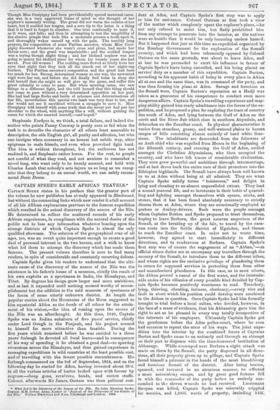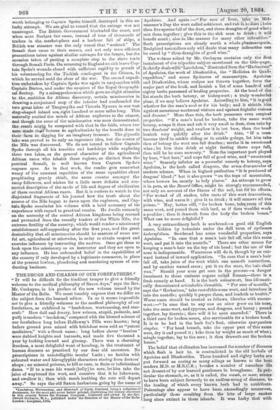CAPTAIN SPEKE'S EARLY AFRICAN TRAVELS.* CAPTAIN SPEKE states in his
preface that the greater part of the volume he now publishes has already appeared in Blackwood, but without the connecting links which now render it a full account of all his African explorations previous to the famous expedition which resulted in the actual discovery of the source of the Nile. He determined to collect the scattered records of his early African experiences, in compliance with the natural desire of the public not to lose any information whatever bearing upon the strange districts of which Captain Speke is almost the only qualified showman. The solution of the geographical crux of all ages, too, was an event quite important enough to create a good deal of personal interest in the two heroes, and a wish to know what led them to attempt the discovery which has made them famous. The present volume therefore is sure to find many readers, in spite of considerable and constantly recurring defects.
Captain Speke gives his readers to understand that the ulti- mate cause of the discovery of the source of the Nile was the existence in his father's house of a museum, chiefly the result of his own exploits as a sportsman in India, the Himalayas, and Tibet. By degrees his design grew larger and more ambitious, and at last it expanded until nothing seemed worthy, of accom- plishment but the addition to the said museum of specimens of the fauna of some utterly unknown district. At length the popular stories about the Mountains of the Moon suggested to him equatorial Africa as the locale of all others for the attain- ment of his wishes,—the idea of coming upon the source of the Nile was an afterthought. At this time, 1849, Captain Spoke was an Indian subaltern of five years' service, chiefly under Lord Gough in the Punjaub, and his project seemed to himself far more attractive than feasible. During the five years which remained before he was entitled to a three years' furlough he devoted all local leave—and in consequence of his way of spending it he obtained a good deal—to sporting eveursions across the Himalayas, and thus gained experience in managing expeditions in wild countries at the least possible coat, and of travelling with the fewest possible encumbrances. His furlough commenced on the 3rd of September, 1854, and on the following day he started for Aden, having invested about 3901. in all the various articles of barter looked upon with favour by negroes—cheap guns, revolvers, beads, and cotton stuffs. Colonel, afterwards Sir James, Outram was then political resi.
* What Led to the Discovery of the Source of the Nik. By Jobn Henning Speke, sClartain MM. Indian Army, Author of "Journal of the Discovery of the Source of the Nile." William Blackwood and Sins, Edinburgh and London. 1864.
dent at Aden, and Captain Spoke's first step was to apply to him for assistance. Colonel Outram at first took a view of the matter which completely upset the explorer's plans,—he not only refused to assist him, but flatly prohibited hint from any attempt to penetrate into the interior, as the natives were so hostile that it would be only incurring useless hazard. But it happened that jest at this time an expedition organized by the Bombay Government for the exploration of the Somali country, and which had been vehemently opposed by Colonel Outram on the same grounds, was about to leave Aden, and at last he was persuaded to exert his influence in favour of Captain Spoke's leave being cancelled, and his being placed on service: duty as a member of this expedition. Captain Burton, according to his apparent habit of being in every place in Africa all at one and the same time, was in command of the party, and was then forming his plans at Aden. Savage and ferocious as the Somali were, Captain Burton's reputation as a Hadji was taken as a guarantee of his competence to conduct even more dangerous affairs. Captain Speke's travelling experience and map- ping ability gained him ready admittance into the forces of the ex- pedition, and he proposed a plan for exploring the tract of country due south of Aden, and lying between the Gulf of Aden on the north and the River Jub which rises in southern Abyssinia, and debouches on the Zanzibar coast. In physical characteristics it varies from stoneless, grassy, and well-watered plains to barren ranges of hills consisting almost entirely of hard white lime- stone. The inhabitants are descended from the followers of an Arab chief who was expelled from Mecca in the beginning of the fifteenth century, and crossing the Gulf of Aden, settled amongst the Christian Abyssinians, who then occupied the country, and who have left traces of considerable civilization. They soon grew powerful and ambitious through intermarriage, and at last drove back the entire race of their protectors into the Ethiopian highlands. The Somali have always been well known to us at Aden without being at all admired. They are what Captaiu Speke mildly terms " boisterous," and delight in lying and cheating to an almost unparalleled extent. They lead a nomad pastoral life, and so inveterate is their habit of quarrel- ling and fighting amongst themselves with spears, sticks, and stones, that it has been found absolutely necessary to strictly disarm them at Aden, where they are occasionally employed as porters or donkey-drivers. Such were the people amongst whom Captains Burton and Speke proposed to trust themselves, hoping to leave Berbera, the great caravan emporium of the Somali, at the breaking up of the fair, to travel by the cara- van route into the fertile district of Uganden, and thence to reach the Zanzibar coast. In order not to waste time, however, they agreed to start immediately in different directions, and to rendezvous at Berbera. Captain Speke's first step was of course the engagement of an "Abban,"—an official whose duties are to accompany any travellers through the country of the Somali, to introduce them to the different tribes, and whose rights are the exclusive privilege of plundering theta in return for supposed services in protecting them from other and unauthorized plunderers. In this case, as in most others, the Abban proved a rascal of the first water, and the intermin- able series of his villanies of every possible kind detailed by Cap- tain Spoke becomes positively wearisome to read. Treachery, lying, thieving, cheating, laziness, obstinacy,—every vice and fault in short which his position could develop were combined in the Abban in question. Once Captain Speke had him formally brought to trial before a local sultan, who decided, however, in the face of a mass of evidence, that his Abbanship gave him the right to act as he pleased in every way totally irrespective of the interests of his employers. Ultimately Captain Speke got the gentleman before the Aden police-court, where he soon had occasion to repent the error of his ways. The, joint expe- dition into the interior by the combined forces of Captains Burton and Speke came to an untimely end through an attempt on their part to dispense with the time-honoured institution of Abbanage. While encamped near Berbera a night attack was made on them by the Somali, the party dispersed in all direc- tions, all their property given up to pillage, and Captain Spoke found himself a prisoner in the hands of the most bloodthirsty and ferocious Somali of the district. After being beaten, speared, and tortured in an atrocious manner, he effected a most astonishing escape, and by great good fortune fell in with the remainder of the party before he entirely suc- cumbed to the eleven wounds he had received. Lieutenant Stroyan was killed, Captain Speko was miserably crippled for months, and 1,5001. worth of property, including 610/.
worth belonging to Captain Speke himself, destroyed in this un- lucky attempt. We are glad to record that the outrage was not
unavenged. The British. Government blockaded the coast, and
when next Berbera fair came, instead of tens of thousands of traders in the market-place and a harbour full of ships, a British war steamer was the only vessel that " assisted." The Somali then came to their senses, and not only were efficient precautions taken against similar outrages for the future, but the occasion taken of putting a complete stop to the slave trade through Somali Ports. On returning to England on sick leave Cap- tain Spoke's wounds closed with sufficient rapidity to permit of his volunteering for the Turkish contingent in the Crimea, in which he served until the close of tho war. The second expedi- tion undertaken by Captain Spoke was again in conjunction with
Captain Burton, and under the auspices of the Royal Geographi- cal Society. By a misapprehension which gave no slight stimulus to the..ainbition for African discovery, certain missionaries in drawing a conjectural map of the interior had confounded the two great lakes of Tanganyika and Victoria Nyanza in one vast slug-shaped inland sea, eight hundred or more miles long. This naturally excited the minds of African explorers to the utmost, and though the error of the missionaries was soon demonstrated, the result migh be compared with that in the fable, where two men Made. their fortune as agriculturists by the benefit done to their fartn in. digging for an imaginary treasure. The gigantic lake was proved to be only an ingenious idea, but the source of the Nile was discovered. We do not intend to follow Captain. Speke through all his troubles and hardships while exploring these two lakes, as the general character of the agricultural African races who inhabit these regions, as distinct from the pastoral Somali, is well known from Captain Speke's magnum opus. As in that work, the reader gets somewhat weary of the constant repetition of the same squabbles about propitiating greedy chiefs, the same emeutes amongst the camp followers, and wishes for a little more definite and con- nected description of the mode of life and degree of civilization of these central African races. But it is curious to watch in the disjointed fragments of his journal how the truth about the source of the Nile began to dawn upon the explorers, and Cap- tain Spoke concludes his volume with a brief summary of his experience with regard to practical results. He dwells earnestly On the necessity of the central African kingdoms being rescued and protected from the rascally traders of the White Nile, the extreme fertility of the country, which would render a missionary establishment self-supporting after the first year, and the great desirability that all missionaries should be masters of some use- ful art, agricultural or otherwise, in order to obtain respect and ekercise influence by instructing the natives. Once get them to look -upon the missionary as an instructor and they are open to any influence. He has unbounded belief in the capabilities of the country if only developed by a legitimate commerce, in place of the present lawless, plundering and murdering system of con- ducting business.































 Previous page
Previous page